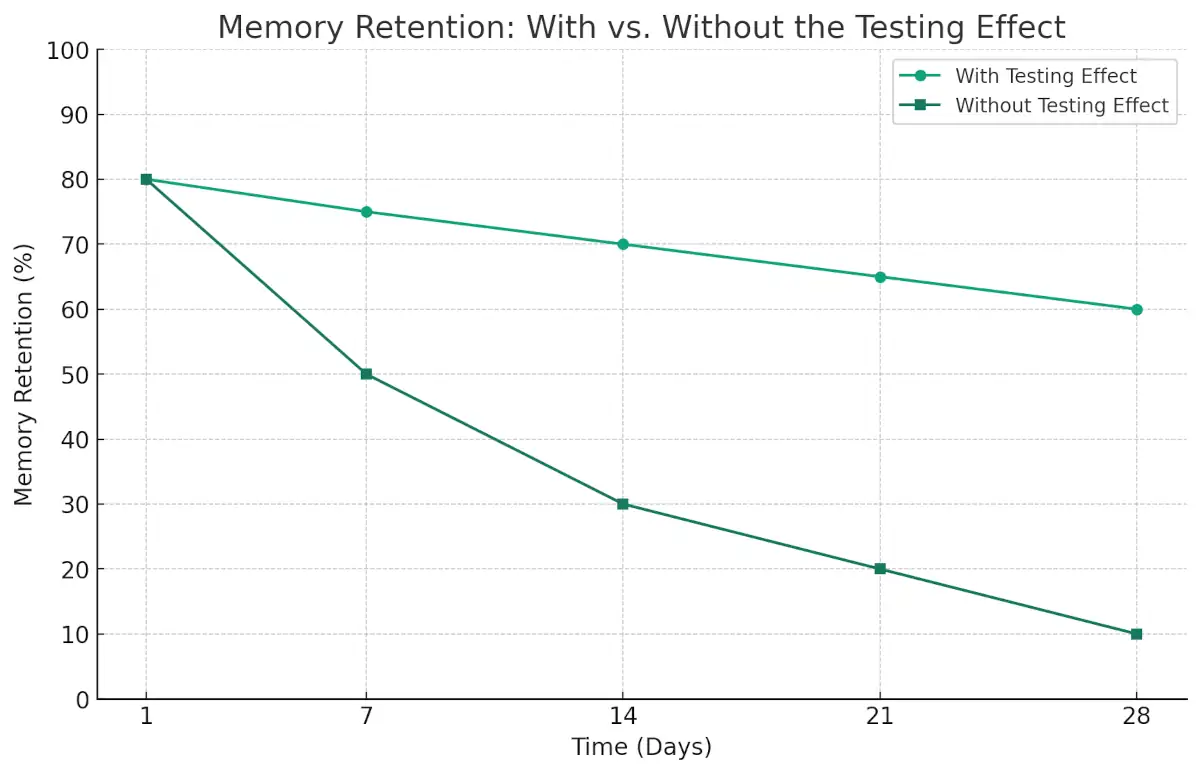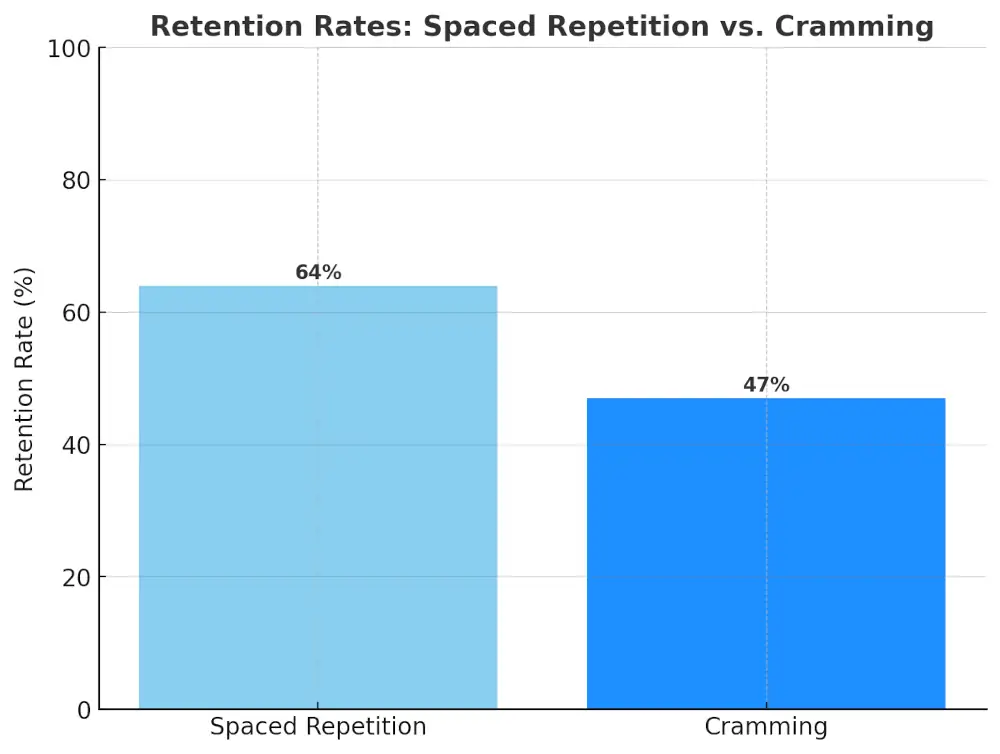What is the testing effect
How to improve memory retention and learning with quizzes
In this article

What is the testing effect?
The testing effect, also known as retrieval practice, is highlighted in a landmark study by Roediger and Karpicke (2006), which demonstrated that students who were tested frequently on material not only performed better on immediate assessments but also retained information more effectively over the long term compared to those who engaged in additional study sessions without being tested. This study underscores the critical role of retrieval practice in enhancing memory consolidation and recall, making it a powerful tool for improving learning outcomes (Roediger, H.L., & Karpicke, J.D. (2006). Test-enhanced learning: Taking memory tests improves long-term retention. Psychological Science, 17(3), 249-255).
How to use the testing effect to your advantage
Dipping your toe into the testing effect by quizzing just once is like going to the gym for a single day and expecting to run a marathon the next—it's a great start, but the real magic happens when you make it a habit. To truly harness the power of the testing effect, you need to transform quizzing from a one-off event into a dynamic, weekly ritual. This consistent practice not only embeds knowledge deep in your memory but also shines a spotlight on the areas that need more work, turning your study sessions into targeted, high-impact learning adventures.
By making quizzing a regular part of your study routine, you're not just memorizing information; you're building a deep, intuitive understanding of your subjects. This approach ensures that when exam time rolls around, you're not cramming—you're reviewing a well-organized, confidently understood collection of knowledge. Let's make quizzing a habit that leads to your ultimate academic success!
What we do repeatedly defines us; excellence, then, is not an act, but a habit- Aristotle
Regular quizzes supercharge memory
Unlock the power of your brain with the testing effect, a game-changing strategy proven to skyrocket test scores and supercharge memory retention! Imagine boosting your exam performance by up to an astonishing 50% just by changing how you study. That's not fantasy; it's science. Research by Roediger and Karpicke (2006) reveals that students who leverage frequent testing, instead of just hitting the books harder, can significantly enhance their long-term retention and ace those crucial exams. But wait, there's more! This isn't just about cramming in more facts; it's about making them stick. Studies have shown that incorporating regular quizzes into your study routine can improve memory retention by an impressive 150% over traditional studying methods (Karpicke & Roediger, 2007). Yes, you read that right—turning your study sessions into quiz sessions could make your brain a veritable fortress of knowledge, impervious to the forgetfulness that plagues so many during exam time. And the cherry on top? This method doesn't just work for the short term. McDaniel et al. (2011) demonstrated that students who engaged in frequent testing not only performed better in their immediate assessments but also retained a significantly higher amount of information weeks later. This approach ensures that when finals roll around, you're not just relearning; you're reviewing. So, if you're looking to crush your next exam and make forgetting a thing of the past, it's time to embrace the testing effect. Make quizzes your new best friend and prepare to be amazed at how much you can remember and achieve. Your brain is capable of incredible feats—give it the workout it deserves and watch your scores soar!

The graph illustrates the dramatic difference in memory retention over time when leveraging the testing effect versus not using it. With the testing effect—achieved through regular quizzing and retrieval practice—memory retention remains significantly higher across the board, showcasing a gradual decline rather than a steep drop. This visual representation underscores the power of making quizzing a habitual part of your study routine to enhance and sustain memory retention.
Is cramming actually that bad? Short-Answer: Yes
Research consistently demonstrates that regular study habits yield significantly better long-term retention and understanding compared to single cram sessions. Here are some key points and illustrative statistics drawn from various studies:
- Retention Rates: Students who engage in spaced repetition, a study habit where learning is spread out over time, can retain material up to 50% better over the long term compared to those who cram. For example, a study by Cepeda et al. (2006) found that spaced study sessions led to a retention rate of 64% after a month, compared to 47% for those who crammed.
- Exam Performance: According to a study by Karpicke and Roediger (2007), students who tested themselves on material (a form of active recall) scored on average 80% on tests, while those who studied the material in one session without self-testing scored around 60%.
- Efficiency of Learning: A study by Dunlosky et al. (2013) found that students who practiced distributed practice (studying over time) and retrieval practice (testing themselves) needed less overall study time to achieve the same level of performance as those who crammed.
- Impact on Higher-Order Thinking Skills: Regular study habits, especially those that incorporate active recall and spaced repetition, not only improve retention but also enhance the ability to apply knowledge in different contexts. This is critical for developing higher-order thinking skills such as analysis, synthesis, and evaluation.
- Reduction in Stress: Research indicates that students who develop and stick to a consistent study schedule experience lower levels of stress and anxiety around exam times compared to those who rely on cramming. This is partly because the gradual accumulation of knowledge feels less overwhelming and more manageable.
While cramming might seem like an effective last-minute strategy, the evidence overwhelmingly supports the superiority of consistent study habits for long-term learning, understanding, and well-being.

The updated graph highlights the significant difference in retention rates between spaced repetition and cramming.
How to stop last minute cramming with behavioral science
In order to actually improve your test scores and memory retention being a last minute crammer simply isn't enough! Embracing a shift from cramming to consistent learning can be deeply influenced by principles of behavioral science. Here’s how you can apply these principles to form new study habits:
- Leverage the Power of Small Habits: Begin with tiny, incremental changes to your study routine. Behavioral science suggests that small habits are more likely to stick because they require less willpower to start. For instance, commit to reviewing one topic per day for just 15 minutes.
- Set Clear, Achievable Goals: Define what success looks like each week. Goals should be specific, measurable, attainable, relevant, and time-bound (SMART). This clarity makes progress easier to track and achievements more rewarding.
- Utilize Cue-Routine-Reward Loops: Identify a regular cue to initiate your study session (e.g., a specific time of day or location) and follow it with the routine of studying. Then, reward yourself to reinforce the habit loop. Rewards could be as simple as a favorite snack or a short break doing something you enjoy.
- Break Tasks into Smaller Chunks: Behavioral science shows that breaking down tasks into smaller, more manageable parts can reduce the feeling of being overwhelmed, which often leads to procrastination. Tackle one small topic at a time to gradually build up your knowledge.
- Practice Self-Compassion: Change is hard, and setbacks are part of the process. Rather than being self-critical, practice self-compassion. Acknowledge your efforts and the progress you've made, no matter how small.
- Seek Social Support: Share your goals with friends or study groups. Social support can enhance motivation and accountability. Additionally, teaching concepts to others is a powerful way to reinforce your own learning.